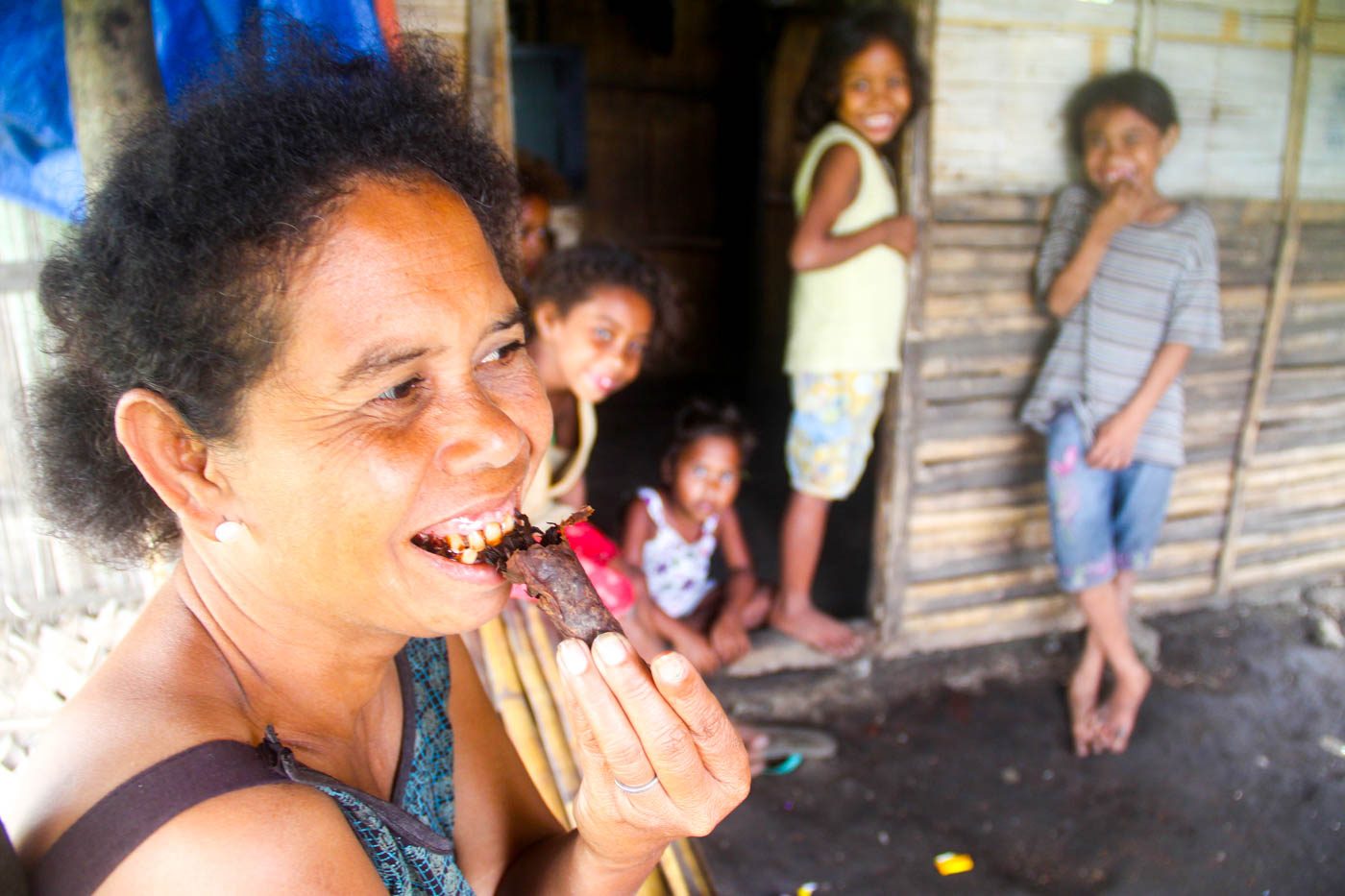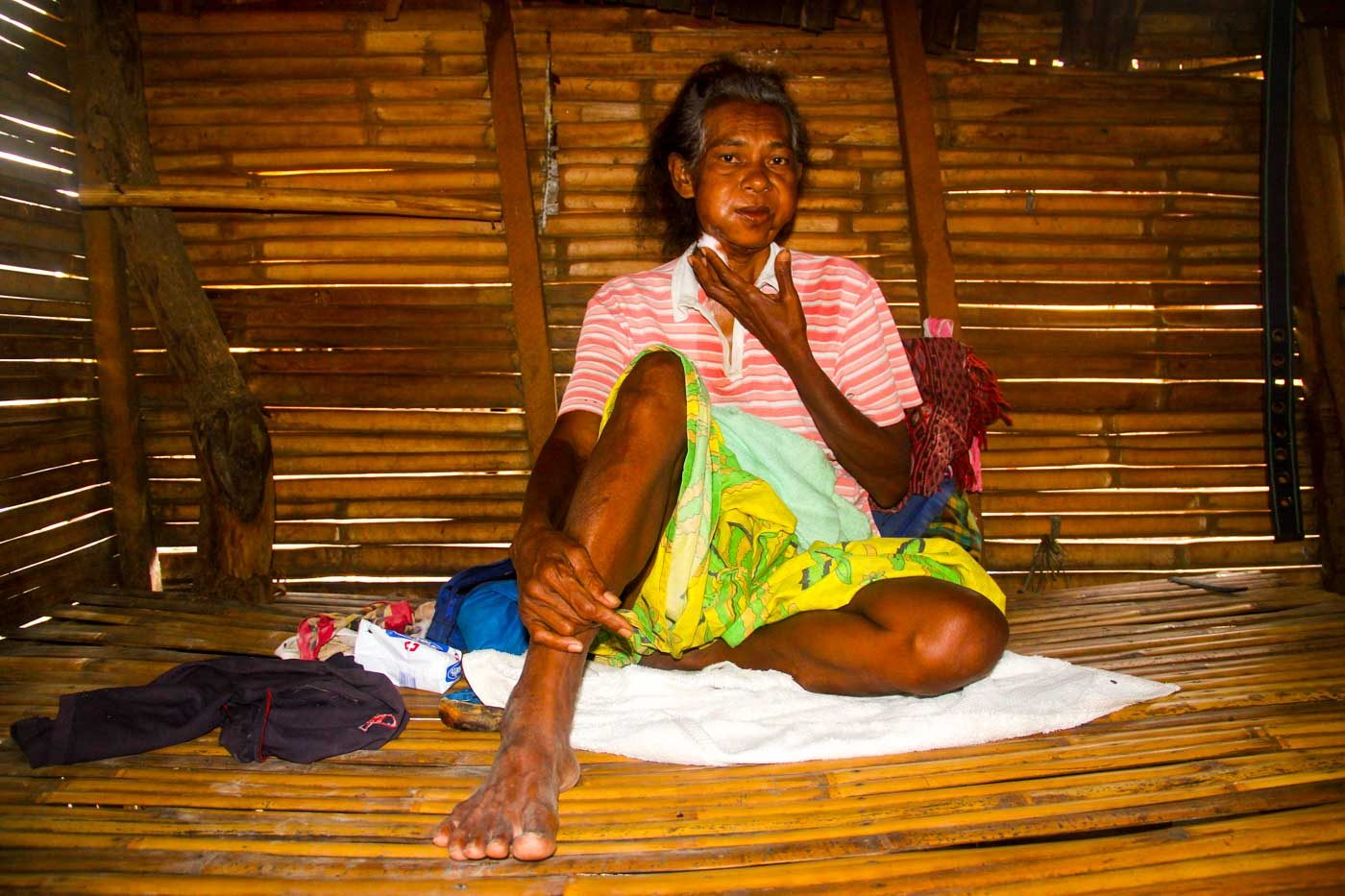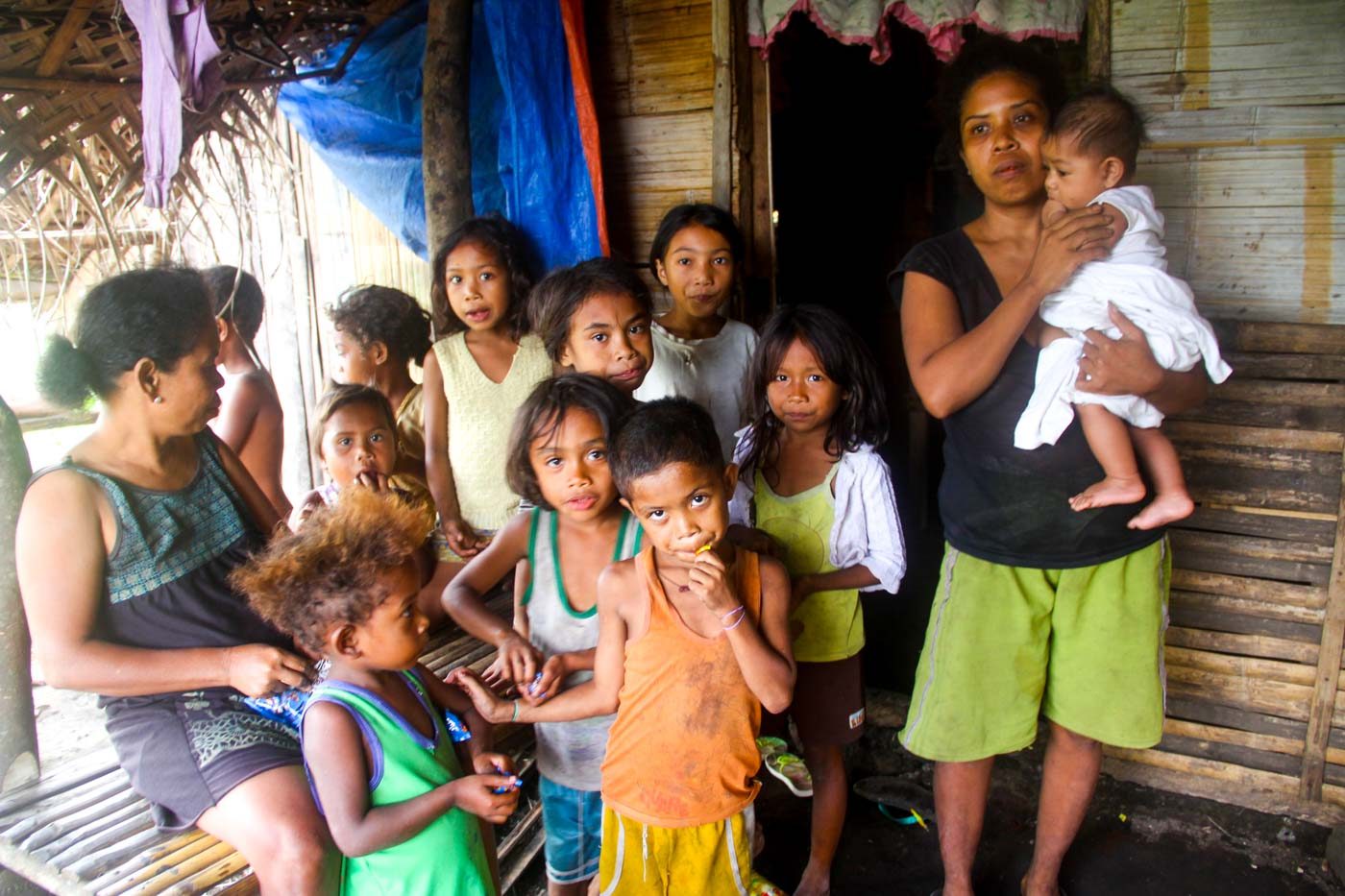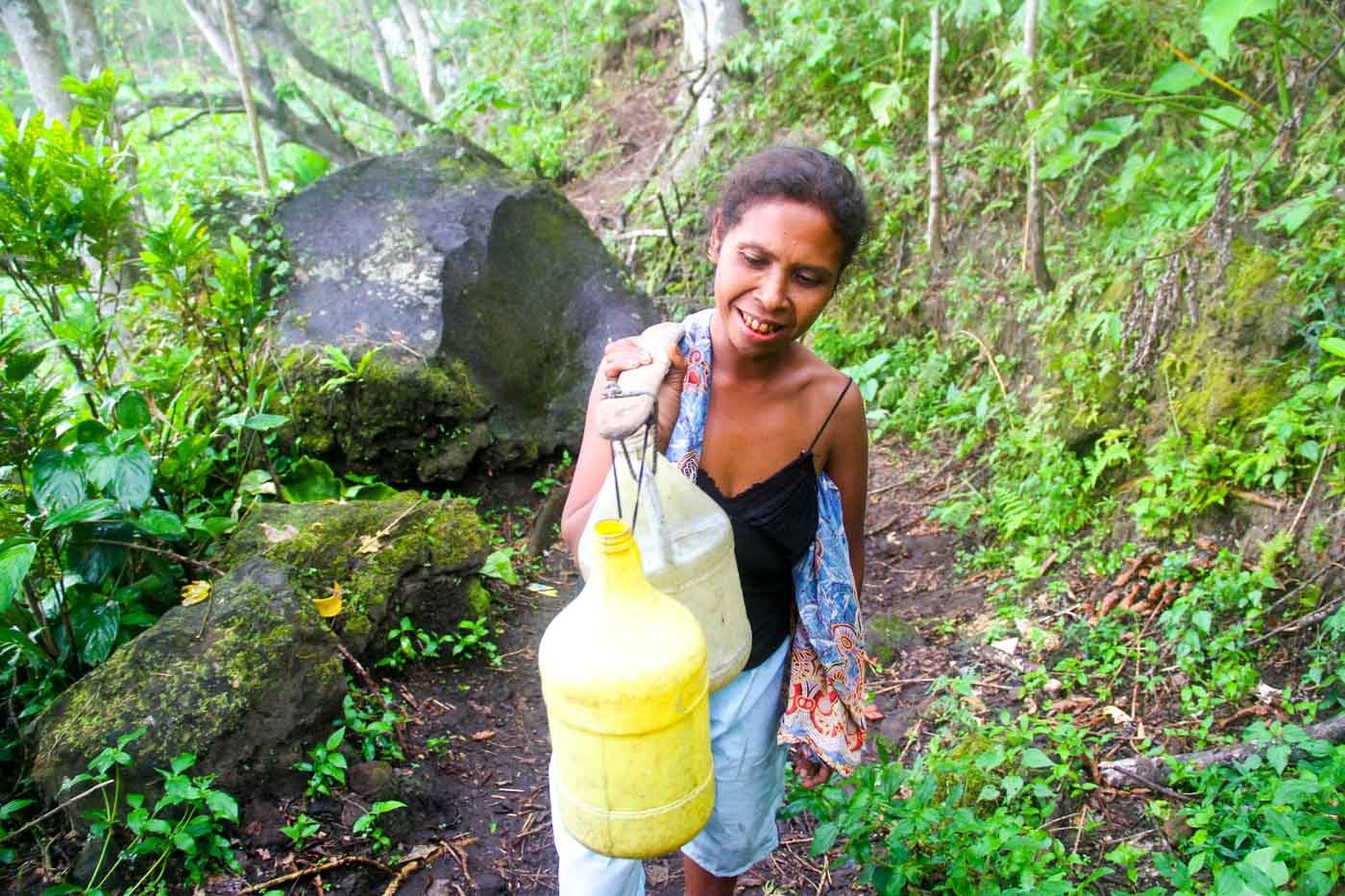SUMMARY
This is AI generated summarization, which may have errors. For context, always refer to the full article.

IRIGA CITY, Camarines Sur – The Agta-tabangnon tribe in the mountains of Bicol region would rather chew tobacco to numb their pain caused by illnesses than visit the government healthcare centers in the lowlands.
They said lowlanders only discriminate against them. Besides, they usually can’t spare the money for a ride to see a doctor or buy the medicines they will prescribe.
The tribe pays for this practice – nganga chewing – when they reach old age. It is said to be the cause of a high incidence of mouth cancer in the community.
“Nganga chewing causes mouth cancer due to chemical content from tobacco and lime,” said Alex Quiñones, the resident dentist of the National Commission on Indigenous Peoples (NCIP) in the region.
“The problem is, we cannot cure the disease because IPs rarely seek medical assistance. Or they only get checked at the late stage [of their cancer] and it is already beyond remedy,” he said.
The Philippines passed in 2012 a sin tax law that promises to make sure Filipinos get access to reliable healthcare. But the experience of the Agta-tabangnon tribe shows indigenous peoples are still left out, even as the law has generated a significant windfall for government.
Claudia Vargas, 58
Claudia Vargas, 58, is one of the Agta-tabangnons suffering from mouth cancer after years chewing tobacco.
Her face is swollen with pus that is discharged from a wound in her jaw. Perhaps it is the smell of the wound that keeps shoals of flies near her tilted bamboo house located right at the slopes of beautiful Mount Isarog. She covers the wound but the pus keeps oozing and dropping onto her shirt.
She barely talks. She finds it difficult to chew solid food so she usually eats porridge.

“We have 4 cases of mouth cancer that we believe were triggered by nganga chewing,” according to Bartolome “Lome” Oafalas, overall chieftain of 4 Agta-tabangnon subgroupings.
Nganga is also called ma’ma or ogbas, a mixture of buyo or betel leaf, lime, areca nut, and raw tobacco. Most cancers are not attributed to particular causes, but numerous studies worldwide have linked chewing raw tobacco to an increased risk of mouth cancer.
Mouth cancer has been recorded among the Agta-tabangnon tribe since the 90s. Three died of it recently where Vargas lives, in the Ilian Tribal Settlement in the town of Buhi. Quiñones believes many more cases are undocumented.
But deaths have not discouraged the tribesmen from chewing ma’ma. Vargas herself still swears by its efficacy.
“I never go to any public and private hospital for check up as we solely rely on herbal medicine; ma’ma alone can cure our illnesses. Curing our illnesses using herbal medicine is also our way to evade discrimination from the lowlanders,” Vargas told Rappler.
Consolacion Fragenal, a 72-year-old retired NCIP doctor who continues to do volunteer work for the tribe, said only about 20% of the tribe seek medical assistance. It is no surprise that respiratory diseases such as bronchitis – aside from the usual problems that afflict poor people living in areas with poor sanitation – is common.
Vargas said she visited a doctor only once. She was told to go back to get treatment, but said she doesn’t have the money to pay for the tricycle ride or buy the medicines the doctors would prescribe.
She’s weak but she has 3 grandchildren to take care of. Their father was killed in a road mishap a year ago. Their mother suffered a heart attack soon after.
Geographically isolated, disadvantaged

Nganga chewing is a lifestyle among the tribesmen in Bicol. Feliza Tolosa, 34-year-old mother to 5 children, said she can’t live without it.
“We can survive without eating but not without ma’ma to keep us alert and full. We’re stronger with tobacco quid,” Tolosa told Rappler.
She speaks of the sedative anaesthetic and euphoric feeling it gives her. She said it cures headache, gastric pains, itchiness, even diarrhea and other illnesses. For stomach pains, members of the tribe chew nganga then spit out a good dose of saliva to be rubbed on their stomach like a balm.
They do think about going to the rural health units when nganga and their other herbal medicines do not work to ease their pain. But it’s a luxury that the tribe cannot afford.
Unlike Vargas, Tolosa belongs to a subgrouping that lives on top of Mount Isarog. Going to the rural health unit in the lowland means hiring a habal-habal driver from the town proper who is willing to climb to the mountain top and drive back to the lowland.
Life is hard for Tolosa and fellow tribespeople who live in what the government refers to as Geographically Isolated and Disadvantaged Areas (GIDAs). Access to basic services is problematic.
Oafalas said majority of the tribe are jobless and rely only on the vegetation around them for food. Typhoons and dry spells have affected their harvest, however. Those who get jobs from lowlanders don’t earn enough either.

Where do sin tax revenues go?
The sin tax law mandates that the revenue generated must be used to fund universal healthcare in the country. This goal is defeated, however, when IPs continue to be left out.
NCIP regional director Evelyn Jacob said only a fraction of the tribe are benefitting from Philhealth, the government’s health insurance provider. While the region boasts of having enrolled 89% of its population under Philhealth, registration remains problematic among IPs – only 30% – despite efforts to reach out to them.
Under the zero balance billing policy, Philhealth members among them are not supposed to shell out money when they go to public hospitals. They are also supposed to be prioritized, based on a memorandum issued by the regional office of the Department of Health.
Reality is different, however. “Government hospitals’ usual problems are no available medicines, defeating the zero-balance billing policy for poor patients, specifically the indigenous tribesmen in Bicol,” admitted Philhealth regional director Orlando Iñigo.
Philhealth beneficiaries end up buying them with their own money. According to the DOH regional office, up to 80% of sin tax revenues go to infrastructure such as cancer and kidney centers.
NCIP regional director Evelyn Jacob said they’re doing their best to help out the IP but they can only do so much with their meager budget. They were allocated P45 million ($905,000) for 2017.
Oafalas said the Department of Social Welfare Department’s Conditional Cash Transfer (CCT) program is also very helpful especially with its initiatives for geographically isolated and disadvantaged areas (GIDAs).
But like the Philhealth program, only about 30% of the IPs are CCT beneficiaries, said Oafalas. Most are still left out. – Rappler.com
*$1 = P49.72
Add a comment
How does this make you feel?
There are no comments yet. Add your comment to start the conversation.